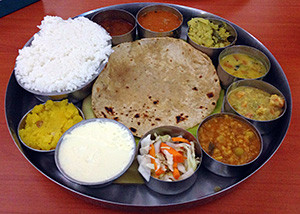You’ve probably heard of mindfulness and mindfulness meditation. But have you heard of eating mindfully? And if you have, do you know what it really means?
I thought I did. Eating mindfully. Yes, I get it, being completely mindful of what I’m eating, right? Well, I thought I’d got it. Until I went on Vipassana.
Eating mindfully on Vipassana
 A Goenka-style Vipassana meditation course consists of sitting for 10 hours a day, for 10 days, in complete silence. It’s a pretty intense experience, but one I hope to repeat. The course I completed in 2014 was in Kolhapur in India. It’s in a beautiful setting and the food served far exceeded my expectations – I even got used to eating Indian breakfasts every day!
A Goenka-style Vipassana meditation course consists of sitting for 10 hours a day, for 10 days, in complete silence. It’s a pretty intense experience, but one I hope to repeat. The course I completed in 2014 was in Kolhapur in India. It’s in a beautiful setting and the food served far exceeded my expectations – I even got used to eating Indian breakfasts every day!
When all you’re doing every day is meditating, with no reading or writing materials, no phone, no computer and no physical exercise allowed (not even yoga practice – shock, horror), mealtimes really do become the highlight of your day. So I guess it’s no wonder that I started eating more mindfully. But I didn’t fully appreciate this until the last day of the course, when the vow of noble silence is purposefully broken. Up until this point, I had nothing to do while I was eating but concentrate on my food. We weren’t allowed to speak to anyone, there was nothing to watch or look at in the dining hall, and even eye contact with others was discouraged. So all I could do was focus on my food.
Sometimes I didn’t know exactly what I was eating, so I would look at each type of food trying to work out what it was made from. I inspected and felt and tasted each mouthful, savouring the textures and flavours in my mouth, chewing slowly and visualising how each mouthful was passing through my digestive tract, providing me with nutrients and nourishing my body. I would make the activity of eating last as long as possible, savouring each moment, because once it was over it was back to my meditation cushion!
Going… going… gone!
 I hadn’t realised how mindfully I’d been eating until the final day. Suddenly we could talk again and the air was filled with people babbling, chit-chatting and nattering away. It was so noisy! The dining hall became a very different place and I found myself eating the usual lunchtime thali surrounded by other female travellers sharing our experiences of the course, recounting travel stories and discussing what was next on our travel agendas.
I hadn’t realised how mindfully I’d been eating until the final day. Suddenly we could talk again and the air was filled with people babbling, chit-chatting and nattering away. It was so noisy! The dining hall became a very different place and I found myself eating the usual lunchtime thali surrounded by other female travellers sharing our experiences of the course, recounting travel stories and discussing what was next on our travel agendas.
Suddenly I realised all the food on my plate was gone, but I was barely aware of having eaten it! I knew what food I had consumed but I couldn’t accurately remember how it all tasted, or what the textures had felt like in my mouth, or how I really felt whilst eating it. And I realised this is probably how I eat most of the time. In fact, this is probably how most of us eat most of the time. Mealtimes are often very sociable occasions, and we’re usually too busy chatting or reading or watching TV to really pay full attention to what or how we’re eating.
Counting the chews
So I set an intention to start eating more mindfully in the future. Of course that didn’t last very long. About as long as the meditation practice in fact! But I tried it again during my last trip to Mysore, when someone suggested counting the number of times I chew each mouthful as a way to eat more calmly and maintain good digestion.
I realised this was a great way to eat mindfully, as it gives you something to focus on whilst eating. And I was amazed to discover that it’s actually quite easy to chew each mouthful the recommended 30-40 times, even though that sounds an awful lot. By doing so, you help your digestive system as the saliva does most of the breaking down in your mouth, leaving little remaining that actually needs to be swallowed.
Emotional eating vs positive thinking
 As well as paying full attention to each mouthful of food, eating mindfully also has a lot to do with how you’re feeling. We all know about comfort or emotional eating and have heard plenty of advice telling us not to eat when we’re angry, upset or stressed. But what about our attitude to the food we’re eating? I strongly believe that the way we feel about our food whilst eating it can have a direct impact on how well it is digested and processed by our body.
As well as paying full attention to each mouthful of food, eating mindfully also has a lot to do with how you’re feeling. We all know about comfort or emotional eating and have heard plenty of advice telling us not to eat when we’re angry, upset or stressed. But what about our attitude to the food we’re eating? I strongly believe that the way we feel about our food whilst eating it can have a direct impact on how well it is digested and processed by our body.
I would even go so far as to say that someone eating a relatively healthy snack with a negative attitude will suffer more consequences than someone eating a “naughty” snack with a positive attitude. So, if you eat a cheese sandwich whilst feeling guilty and worrying about whether the bread will make you bloated or the cheese will cause a lactose intolerance, it’s got to have a worse effect than if you eat a slice of cake whilst savouring every mouthful, thinking only positive thoughts and feeling that you deserve this delicious treat. I mean, obviously you can’t always eat this way – everything in moderation and all that – but you catch my drift.
Mindfulness in schools
I really believe in the benefits of eating mindfully and, even if this post doesn’t inspire you to give it a go, I hope that at least writing it will be a good reminder to myself!
And whilst we’re on the subject of mindfulness, I’ll leave you with this wonderful article in The Guardian about how mindfulness meditation is being introduced in schools – in Brighton no less – with very tangible results.
Be mindful, be happy!
– Hannah
Do you eat mindfully?
Do you practise mindful eating? Have you experienced the benefits first hand? We love hearing from you, so do share your stories in the comments section below.

No comments yet.